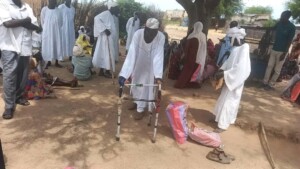‘Port Sudan hospitals see more Chikungunya patients’: health source
Health sources in Port Sudan have pointed out that Chikungunya fever has made its return and is spreading in the capital of Red Sea state, following a significant decrease of the infection rate over the last period.
 Patients in a Sudanese clinic (file photo)
Patients in a Sudanese clinic (file photo)
Health sources in Port Sudan have pointed out that Chikungunya fever has made its return and is spreading in the capital of Red Sea state, following a significant decrease of the infection rate over the last period.
A health worker told Radio Dabanga that the incidences of infection with the mosquito-borne disease have spread in the peripheral areas. “Patients find it very difficult to obtain medicines, especially the pendulum venous solutions,” the source said. No numbers of incidences have yet been confirmed.
The health worker pointed to the weakness of the state's campaigns to cleanse the environment and the government's lack of fog spray campaigns, which would deter mosquitoes carrying the disease and breeding. The Aedes aegypti mosquito, the same kind that spreads dengue and Zika virus, is known to transmit the virus.
Poor sanitation and contamination of drinking water are blamed for the spread of diseases such as cholera and chikungunya, which have become endemic in parts of the country.
Mid-February, a journalist in Port Sudan also reported an increase in the number of incidences of Chikungunya fever. He said that the rise of prices of intravenous pendulum solution rose from SDG220 to SDG300 ($6.30*).
In Sudan
There is no specific antiviral drug treatment for Chikungunya fever. Most patients recover fully within weeks, but in some cases joint pain may persist for several months, or even years. With older people, the disease can contribute to the cause of death.
A government report this year showed the emergence of more than 10,000 cases of Chikungunya fever in Sudan’s Red Sea state over the past four months. In November, Radio Dabanga reported a rise of rates of chikungunya fever infections in eastern districts of Port Sudan in Red Sea state.
An outbreak of Chikungunya fever began in August last year after heavy rains hit Sudan’s eastern Kassala state and El Gash river flooded large pieces of land. In October, health sources told Radio Dabanga that the number of patients admitted to health centres and private clinics in the eastern Sudanese state was increasing. Government officials reported at the time that at least 13,400 people in Kassala are infected with the mosquito-borne disease.
* As effective foreign exchange rates can vary widely in Sudan, Radio Dabanga bases all SDG currency conversions on the Market Makers Mechanism-determined daily US Dollar rate quoted by the Central Bank of Sudan (CBoS).











 and then
and then